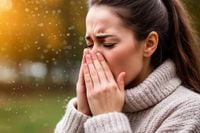As pollen season approaches, many individuals suffering from allergies are seeking effective ways to manage their symptoms. Allergist-immunologist Elvira Tyulyakova from the "Fomin Clinic" network has shared valuable advice on how to navigate this challenging time, emphasizing the importance of minimizing exposure to allergens.
Tyulyakova recommends the use of special glasses and nasal filters, which can significantly help allergy sufferers during peak flowering periods. These tools are designed to limit direct contact with pollen and subsequently reduce the severity of allergic reactions. Alongside these protective measures, she suggests wearing masks and sunglasses to safeguard mucous membranes from pollen exposure.
Monitoring pollen levels is crucial for individuals with allergies, as it helps them stay informed about the start and end dates of plant flowering. Tyulyakova urges allergy sufferers to keep their car windows closed while driving, as this simple measure can prevent pollen from entering the vehicle.
Upon returning home, there are several steps that allergy sufferers should take to minimize symptoms. Changing clothes, taking a shower, and rinsing the eyes, nose, and mouth are essential practices to eliminate any pollen that may have clung to the body. Furthermore, sealing windows in the apartment and utilizing air conditioning or air purifiers equipped with HEPA filters can create a safer indoor environment.
Sleeping with the windows closed is another recommendation from Tyulyakova, who also advises frequent wet cleaning of living spaces to reduce allergens. It is advisable to avoid drying laundry outside, as this can lead to additional pollen exposure.
Tyulyakova elaborates on the best practices for ventilating homes: "It is desirable to ventilate rarely, better in the evening, in calm weather, after a prolonged rain, in colder weather. When opening windows, it is better to use some kind of barrier on the windows: an anti-pollen net, damp gauze, spunbond, various screens." This approach helps to reduce the amount of pollen that enters the home.
Additionally, she warns against outdoor activities during windy, dry, and sunny weather, particularly in the mornings when pollen counts are typically at their highest. It's also advisable to avoid going outside before, during, or immediately after rain, as this can exacerbate symptoms.
For those planning to travel, limiting trips to areas with high pollen concentrations is recommended. Tyulyakova advises using nasal medications that can block contact with allergens for extra protection. However, she emphasizes that these should not replace primary drug therapy.
Washing the nose after outdoor activities can help alleviate allergy symptoms. This can be done using drops, sprays, or a "soft shower" device, with a preference for rinsing with larger volumes and isotonic solutions for daily use.
When preparing for pollen season, it's crucial to consider individual allergy manifestations. Tyulyakova recommends having quick-relief medications on hand, such as inhalers for bronchial asthma, antihistamines, and local eye and nasal drops. Hormonal drugs should also be included in case of severe reactions.
Most anti-allergy medications can be used for extended periods, but Tyulyakova warns against using drugs that contain vasoconstrictors due to the risk of developing a dependency.
In a previous interview, Tyulyakova explained that a typical manifestation of pollen allergy is sneezing, which can be bothersome for many. She also highlighted the potential benefits of a new allergy vaccine, which could offer additional relief to those affected.
Understanding pollen, which is essentially a collection of pollen grains from seed plants, is vital for managing allergies effectively. Allergy, defined as a hypersensitivity of the body, is triggered by the adaptive immune system in response to non-infectious substances from the environment.
As the pollen season unfolds, individuals are encouraged to adopt these strategies to mitigate their symptoms and enjoy the beauty of spring without the burden of allergies. By taking proactive measures and staying informed, allergy sufferers can navigate this challenging time more comfortably.

